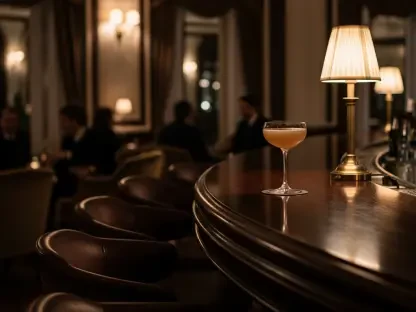In the picturesque town of Dyserth, Wales, The Marian Resort and Spa emerged as a beacon of luxury following a multi-million-dollar renovation by Lyons Holiday Parks, with a grand reopening celebrated in March 2024. However, the dream of establishing a five-star reputation was shattered just months later when an unannounced inspection by local health authorities on October 16, 2024, delivered a devastating blow: a zero Food Hygiene Rating. This alarming outcome has cast a shadow over the resort’s high-end aspirations, leaving guests and industry observers questioning how such a newly refurbished venue could falter so drastically on basic safety standards. The findings have sparked intense scrutiny, revealing systemic issues that threaten not only the resort’s credibility but also the trust of those who expected an impeccable experience. What led to this dramatic failure, and what does it mean for the future of this once-promising destination?
Uncovering Severe Food Safety Breaches
The inspection at The Marian Resort and Spa revealed a staggering 19 breaches of food safety protocols, painting a troubling picture of negligence in a venue meant to epitomize luxury. Among the most concerning discoveries were instances of unfit and decaying food, including stone bass fillets that had clearly gone bad. Unlabeled items, such as vacuum-packed seabass and cod, added to the chaos, making it impossible to track their freshness or origin. High-risk foods like chicken breasts, hummus, and mozzarella were found well past their use-by dates, posing serious health risks to unsuspecting diners. These violations were not minor oversights but glaring failures that suggest a fundamental disregard for the basic principles of food handling. Such lapses are particularly shocking in a resort that invested heavily in its image, raising questions about how these issues went unnoticed for so long before the authorities stepped in.
Beyond the spoiled and unlabeled food, the inspection uncovered dangerous practices in equipment use that heightened the risk of cross-contamination. Chopping boards designated for raw and cooked meats were improperly placed, creating a clear pathway for harmful bacteria to spread. Even more concerning was the misuse of a handwashing sink for cleaning equipment, a practice that defies the most elementary rules of kitchen hygiene. These findings indicate not just isolated mistakes but a systemic breakdown in operational standards. The gravity of these violations cannot be overstated, as they directly jeopardize guest safety and undermine the trust that any dining establishment must uphold. For a resort aiming for top-tier status, such errors are a profound misstep, pointing to deeper flaws in oversight and accountability within the kitchen’s day-to-day functioning.
Sanitation Shortfalls in a Luxury Setting
Sanitation, a cornerstone of any reputable hospitality venue, was found to be woefully inadequate at The Marian Resort and Spa. Inspectors reported dirty equipment throughout the kitchen, a basic failure that could easily lead to bacterial growth and contamination. Heavily worn chopping boards, which are notorious for harboring pathogens if not replaced regularly, were also noted as a significant concern. This lack of cleanliness is particularly jarring in a facility that markets itself as a premium destination, where guests expect nothing less than pristine conditions. The presence of such sanitation issues suggests a troubling lapse in routine maintenance and inspection, calling into question the resort’s commitment to providing a safe environment for its patrons. How could a venue with such ambitious branding overlook these fundamental aspects of hospitality?
Adding to the sanitation woes, the state of food storage at the resort was equally alarming. Inside the walk-in freezer, inspectors discovered freezer-burnt and unidentifiable food items stored improperly, a clear violation of safe storage practices. This not only reflects poor inventory management but also raises concerns about the quality of ingredients being served to guests. Such negligence in maintaining proper storage conditions can lead to spoilage and health hazards, further eroding confidence in the resort’s dining operations. The contrast between the luxury image projected by the venue and the reality of its behind-the-scenes practices is stark. These findings underscore a critical need for stricter internal controls and a reevaluation of how the resort prioritizes hygiene over aesthetics or cost-saving measures in its day-to-day operations.
Pest Control Issues Compound the Crisis
Pest control emerged as another critical area of failure during the inspection of The Marian Resort and Spa. A large number of flies were observed in the dry store area, indicating an immediate hygiene risk that could contaminate food supplies. Compounding the issue, the placement of an electronic fly killer was deemed ineffective by inspectors, rendering it useless in addressing the infestation. These findings point to a lack of attention to environmental controls that are essential in any food preparation setting. The presence of pests in a luxury resort is not only a health concern but also a severe blow to its reputation, as guests expect an immaculate and pest-free environment. This oversight highlights a broader failure to implement proactive measures that could have prevented such a visible and preventable problem.
Further deepening the pest-related concerns, a separate anonymous complaint received on October 20, 2024, raised alarms about a potential rodent infestation at the resort. Although no rodents were confirmed during follow-up checks, inspectors identified significant structural vulnerabilities, including large holes, uncapped pipework, and gaps in walls and ceilings. These flaws could easily serve as entry points for pests, posing a persistent threat if not addressed. Authorities issued a stern warning that failing to “pest-proof” the building could lead to more severe issues in the future, emphasizing the urgency of corrective action. This situation reveals a troubling gap in the resort’s infrastructure maintenance, suggesting that even with substantial renovation investments, critical details were overlooked. Addressing these vulnerabilities is essential to prevent further hygiene crises and restore confidence in the venue’s safety standards.
Management and Training Failures Exposed
At the core of the hygiene debacle at The Marian Resort and Spa lies a profound lack of staff training and management oversight. Inspectors found that employees were not adequately familiar with the resort’s food safety management system, a critical gap that directly contributed to the numerous violations observed. Without proper training, staff were ill-equipped to handle food safely or adhere to protocols that prevent contamination and spoilage. This deficiency reflects poorly on the resort’s leadership, as ensuring staff competency in hygiene practices is a fundamental responsibility of any hospitality operation. The failure to instill these standards from the outset, especially in a newly reopened venue, points to a significant lapse in planning and prioritization by those in charge.
In response to the damning inspection results, the resort took the drastic step of dismissing senior kitchen management, a move that underscores the depth of accountability issues at play. Follow-up visits by health authorities revealed that cleaning efforts were still ongoing, indicating that proactive measures to maintain cleanliness had not been in place prior to the inspection. This reactive approach, rather than a preventive one, suggests a broader cultural problem within the resort’s operations, where hygiene may have taken a backseat to other priorities. The dismissal of key personnel, while a necessary step, also highlights the need for systemic change, including comprehensive retraining programs and stricter oversight mechanisms. Without addressing these root causes, the resort risks repeating the same mistakes, further endangering guests and its standing in the industry.
Reputation at Stake and Steps Toward Recovery
The zero Food Hygiene Rating dealt a severe blow to The Marian Resort and Spa, clashing sharply with its vision of luxury and excellence. The high expectations set by its extensive renovation and the promise of job creation in the local community now stand in stark contrast to the reality of its operational failures. This rating not only jeopardizes guest trust but also casts doubt on the resort’s ability to deliver on its five-star ambitions. The hospitality industry thrives on reputation, and such a public failure can have lasting repercussions, deterring potential visitors and damaging partnerships. For a venue that aimed to redefine luxury in Dyserth, the fallout from this inspection serves as a harsh reminder that no amount of investment can compensate for lapses in fundamental safety practices.
Determined to reverse the damage, the resort has rolled out a comprehensive action plan to address the myriad issues uncovered. This includes deep cleaning of all kitchen areas, servicing of equipment to ensure compliance with safety standards, enhancements to pest control measures, and extensive staff retraining to prevent future violations. Management has also pledged to work closely with environmental health officers to regain a top rating, emphasizing that guest and staff safety remains the utmost priority. While these steps are a positive start, the road to rebuilding trust will be long and challenging, requiring consistent effort and transparency. The resort’s response, though prompt, must be sustained with rigorous internal audits and a cultural shift toward prioritizing hygiene at every level of operation to ensure that such a failure does not recur.
Lessons Learned and Path Forward
Reflecting on the events that unfolded at The Marian Resort and Spa, the incident served as a sobering lesson for the hospitality sector about the critical importance of maintaining stringent safety standards. The systemic failures in food safety, sanitation, pest control, and staff training exposed vulnerabilities that no amount of luxury branding could mask. These lapses ultimately compromised guest well-being and tarnished a reputation that had been built with significant investment and high hopes. The severity of the zero rating underscored how quickly trust could erode when basic operational standards were neglected, leaving an indelible mark on the resort’s early legacy.
Looking ahead, the path to redemption for The Marian Resort and Spa hinges on a sustained commitment to transformative change. Implementing regular internal inspections, fostering a culture of accountability, and investing in ongoing staff development are vital steps to prevent future mishaps. Collaboration with health authorities should continue to ensure compliance with the highest standards. Additionally, transparent communication with the public about improvements made can help rebuild confidence. This incident should prompt other establishments to reevaluate their own practices, recognizing that prioritizing safety is not just a regulatory obligation but a cornerstone of lasting success in the hospitality industry.









